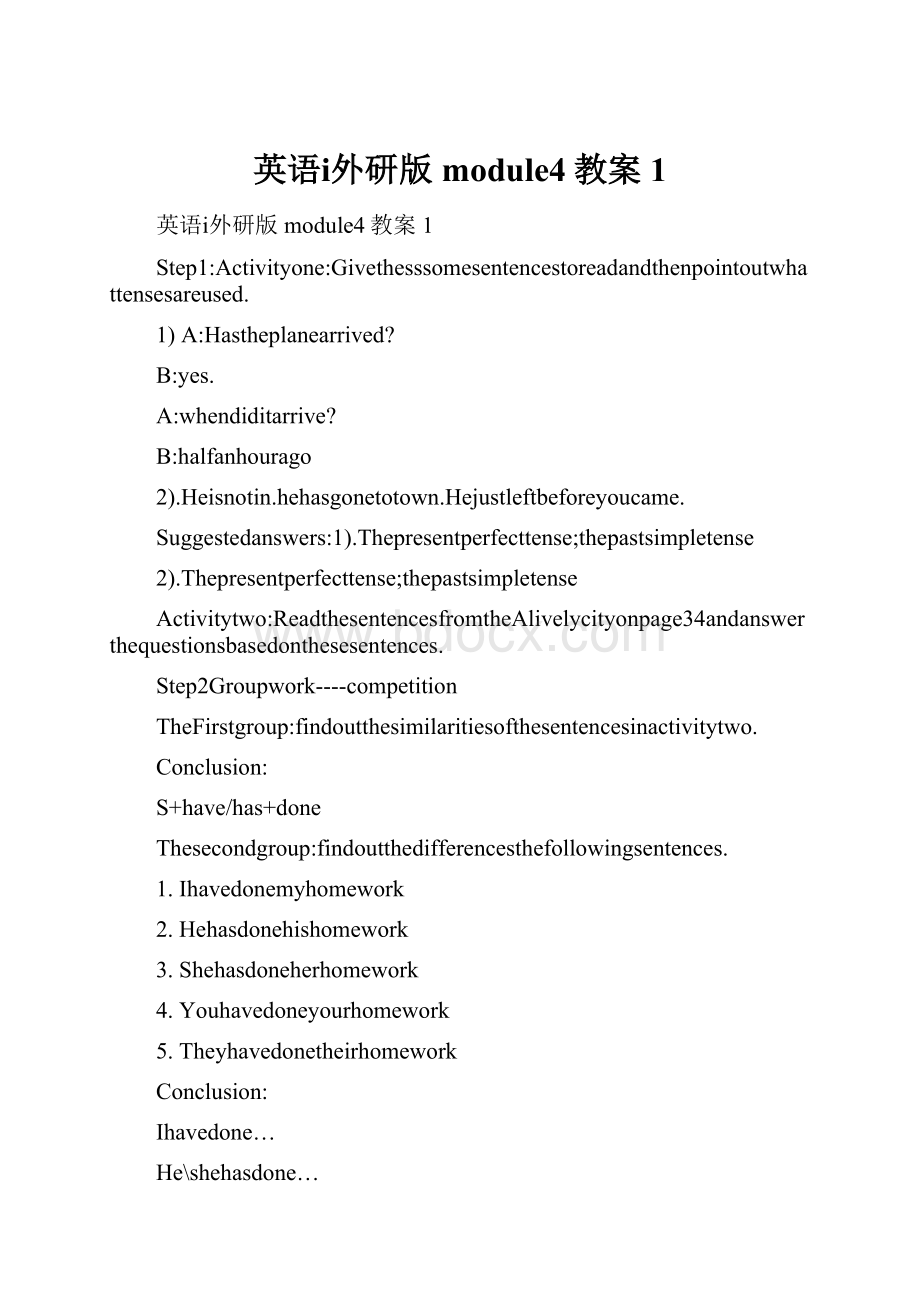英语ⅰ外研版module4教案1.docx
《英语ⅰ外研版module4教案1.docx》由会员分享,可在线阅读,更多相关《英语ⅰ外研版module4教案1.docx(8页珍藏版)》请在冰豆网上搜索。

英语ⅰ外研版module4教案1
英语ⅰ外研版module4教案1
Step1:
Activityone:
Givethesssomesentencestoreadandthenpointoutwhattensesareused.
1)A:
Hastheplanearrived?
B:
yes.
A:
whendiditarrive?
B:
halfanhourago
2).Heisnotin.hehasgonetotown.Hejustleftbeforeyoucame.
Suggestedanswers:
1).Thepresentperfecttense;thepastsimpletense
2).Thepresentperfecttense;thepastsimpletense
Activitytwo:
ReadthesentencesfromtheAlivelycityonpage34andanswerthequestionsbasedonthesesentences.
Step2Groupwork----competition
TheFirstgroup:
findoutthesimilaritiesofthesentencesinactivitytwo.
Conclusion:
S+have/has+done
Thesecondgroup:
findoutthedifferencesthefollowingsentences.
1.Ihavedonemyhomework
2.Hehasdonehishomework
3.Shehasdoneherhomework
4.Youhavedoneyourhomework
5.Theyhavedonetheirhomework
Conclusion:
Ihavedone…
He\shehasdone…
You\theyhavedone…
GuessWhat’sthenegativeformofthosesentencesabove?
S+have\hasnotdone
Conclusion:
现在完成时用来表示过去发生的动作对现在造成的妨碍或结果。
Consolidation:
Completetheexercisetwoonpage34
Grammar2.
GiveSsthesesentencesanddecidewhichgrouptheybelongtoAorB.
A:
describeeventsthatcontinueoveraperiodoftime
B:
describeeventsthathappenataparticularpointintime.
1).youhavelivedhereallyourlife….
2).I’veworkedforit4yearsnow
3).We’vestartedaholidayclubforchildren
4).Alotofchildrenhavejoinedit.
Suggestedanswers:
Sentences1and2describeeventsthatcontinueoveraperiodoftime(thingswhichhappenedinthepastandarestillcontinuinguptothismoment)
Sentences3and4describeeventsthathappenataparticularpointintime
Conclusion:
表示从过去开始一直连续到现在的动作或状态。
在此必须强调动词必须是连续性动词。
这一点也是这一用法的重点和难点。
常见的非连续动词有come,start/begin,buy,borrow,leave,dieandsoon.
备课资料:
现在完成时时态讲解
【一】注意弄清时态的实际意义
现在完成时表示的是在过去某个时间开始并持续到现在的动作/状态,或者过去的动作或状态对现在造成的妨碍或结果。
Theyhaveleft.--他们差不多离开了,也确实是说现在他们人不在那个地方
Ihavehadmylunch.--我差不多吃过午饭了,也确实是说我现在不饿
也可表示持续到现在的动作或状态,或有可能有可能停止,或有可能接着连续下去。
。
HehaslearnedEnglishsince2001.-从2001年开始学的,现在还在接着学着呢
【二】差不多句型结构
现在完成时的构成形式:
have/has(助动词)+done(过去分词)
I/You/They/Wehavetalked.He/Shehastalked.
现在完成时的否定结构确实是在助动词have或has后加上否定词not;
I/You/They/Wehaven’t(havenot)talked.He/Shehasn’t(hasnot)talked.
其一般疑问句确实是将助动词have或has提到句首,
HaveI/You/They/Wetalked.Hashe/shetalked.
确信的简略回答是:
Yes,主语+have/has.,否定的简略回答是:
No,主语+have/hasnot.。
如:
Ihaveseenthefilm.→Haveyouseenthefilm?
Yes,Ihave./No,Ihaven’t.
【三】注意掌握两种差不多用法
1.“过去的经历”:
动作发生在过去的某一时刻且差不多结束,但未说明动作发生的具体时间或情景,强调该经历(即动作发生后)对现在所造成的妨碍或产生的结果。
如:
Ihaveheardoftheman.我听说过那个人。
2.“完成情况”:
表示过去差不多开始并持续到现在的动作或状态,或有可能接着连续下去。
句子中一般有说明其完成情况的短语或从句。
①句子中有“已发生了多久”的时间状语的短语或从句。
如:
●IhavelivedinShanghaisinceIwastenyearsold.我从十岁起就住在上海。
②说明“到说话时为止,已完成了多少”。
即句中,含有表示“完成了多少”的宾语或表示动作发生次数的状语。
如:
Ihavereadthebookthreetimes.这本书我看了三遍。
四、一般过去时与现在完成时的区别
1〕一般过去时表示过去某时发生的动作或单纯表达过去的情况,强调动作;
现在完成时为过去发生的,强调过去的情况对现在的妨碍,强调的是妨碍。
Isawthisfilmyesterday.〔强调看的动作发生过了。
〕
Ihaveseenthisfilm.〔强调对现在的妨碍,电影的内容差不多明白了。
〕
2〕一般过去时常与具体的表示过去的时间状语连用;
现在完成时通常与模糊的时间状语连用,或无时间状语。
一般过去时的时间状语:
yesterday,lastweek,…ago,in1990,inOctober,justnow,from..on,--具体的过去时间状语
现在完成时的时间状语:
for,since,sofar,ever,never,just,yet,till/until,uptonow,inthepastfewyears,recently,--模糊的时间状语
句子中如有过去时的时间副词〔如yesterday,last,week,in1960〕时,
不能使用现在完成时,要用过去时
〔错〕Tomhaswrittenalettertohisparentslastnight.
〔对〕Tomwrotealettertohisparentslastnight.
3〕现在完成时可表示持续到现在的动作或状态,动词一般是连续性的,如live,teach,learn,work,study,know.
一般过去时常用的非持续性动词有come,go,leave,start,die,finish,become,getmarried等。
ShejoinedtheLeaguethreeyearsago.(加入的动作不是连续的)
ShehasbeenintheLeagueforthreeyears(sincethreeyearsago).(在团内的状态可连续)
ShehasbeenaLeaguememberforthreeyears(sincethreeyearsago).是团员的状态可持续)
五、比较连续动词与瞬间动词
连续动词表示经验、经历;
瞬间动词表示行为的结果,不能与表示一段时间的状语连用。
Hehasfinishedthework.他已完成了那项工作。
(表结果)
I’veknownhimsincethen.我从那时起就认识他了。
(表经历)
注意连续性动词和短暂性动词的用法
1.短暂性动词与短暂性时间(时间点)连用。
如:
●HejoinedthePartythreeyearsago.他入党三年了。
(他三年前入党的)
2.用“Itis/hasbeen+时间段+since…”句型。
如:
Itis/hasbeenthreeyearssinceIboughtthebook.这本书我买了三年了。
(从买这本书起到现在已三年了)
3.用相应的连续性动词替换短暂性动词,句中谓语动词用现在完成时,时间状语为“for+时间段”或“since+时间点”。
如:
HehasbeenintheGreenerChinaforthreeyears.----
HehasbeenamemberoftheGreenerChinafotthreeyears.他加入“绿色中国”差不多三年了。
Theoldmandied4yearsago. ----Theoldmanhasbeendeadfor4years.
HejoinedtheParty2yearsago. -----HehasbeeninthePartyfor2years.
Iboughtthebook5daysago. ----Ihavehadthebookfor5days.
英语连续动词与非连续动词的转换
连续性动词表示能够连续的动作,如:
learn,work,stand,lie,know,walk,keep,have,wait,watch,sing,read,sleep,live,stay等。
连续性动词能够与表示时间段的状语连用。
表示时间段的短语有:
for+一段时间:
for2years;since从句,sincehecamehere;
since+时间点名词,sincelastyear,since5daysago;
howlong;foralongtime等。
非连续性动词也称终止性动词、瞬间动词,表示不能连续的动作,这种动作发生后马上结束。
如:
open,die,close,begin,finish,come,go,move,borrow,lend,buy等。
非连续性动词在确信句中与表示时间点的状语连用,如:
twoyearsago;at5o'clock;
例:
Hedied5yearsago.
连续性动词与非连续性动词之间的转换
leave---beawayborrow---keepbuy---have
begin/start---beondie---bedeadfinish---beover
opensth---keepsthopenfallill--- beillgetup---beup
catchacold---haveacoldcomehere---behere
gothere---betherefallasleep---beasleep
getto/arrive/reach---be(in)leave---beawayfrom
gettoknow---knowgo(get)out→beoutputon→wear
比较since和for
since用来说明动作起始时间—“自从……”
for用来说明动作连续时间长度—“长达……”
Ihavelivedhereformorethantwentyyears.
IhavelivedheresinceIwasborn.
Myaunthasworkedinacompanysince1949.
Ihavenotheardfrommyuncleforalongtime.
注意:
并非有for作为时间状语的句子都用现在完成时
Iworkedhereformorethantwentyyears.
(我现在已不在那个地方工作。
)
Ihaveworkedhereformanyyears.(现在我仍在那个地方工作。
)
比较have/hasbeento
have/hasgonetohave/hasbeenin
HewenttoShanghailastweek上周他[做了一件事:
那确实是]去了上海
HehasbeentoShanghai.他(曾经)到/去过上海[在他人生中曾经有过如此的经历,但他人现在确信不是在上海而是回来了]
HehasgonetoShanghai.他差不多去上海了[也许刚动身动身,也许差不多到了,也许还在路上,反正他人不在那个地方]
HehasbeeninShanghaifor10years.他呆在上海迄今为止差不多10年了[现在还在上海没有离开呢]
HelivedinShanghaifor10years.往常他在上海住过10年[现在不在上海了]
连续性动词和瞬间性动词之间的转化
1.Hedied10yearsago.---He________for10years/since10yearsago.
2.Heborrowedthebook2weeksago.
---He________thebookfor2weeks.
3.Heboughtthemotorbikeamonthago.---He________themotorbikeforamonth.
4.Hearrivedherethreedaysago.---He_______heresincethreedaysago.
5.Theyturnedoffthelight2hoursago.---Thelight____________for2hours.
6.Helefthere2yearsago.---He____________fromherefor2years.
7.Thefilmbegan30minutesago.
---Thefilm____________for30minutes.
8.Theyopenedthedooranhourago.
---Thedoor____________foranhour.
9.Theyclosedthedooranhourago.
---Thedoor____________foranhour.
10.Hejoinedthearmylastyear.
--He________a____forayear.
---He____________thearmyforayear.
---It____ayear____hejoinedthearmy.